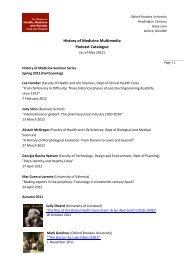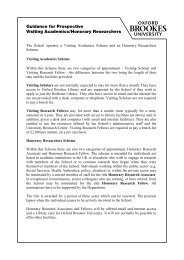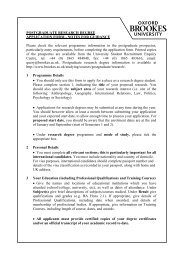PHILOSOPHY - Oxford Brookes University - Department of History
PHILOSOPHY - Oxford Brookes University - Department of History
PHILOSOPHY - Oxford Brookes University - Department of History
Create successful ePaper yourself
Turn your PDF publications into a flip-book with our unique Google optimized e-Paper software.
parts, the first being devoted to Descartes'<br />
Meditations on First Philosophy, the second<br />
to Hume's Enquiries concerning Human<br />
Understanding.<br />
The Philosophy <strong>of</strong> Religion<br />
The module engages with the central issues<br />
that religion raises for philosophy. While the<br />
focus will be on the Western tradition <strong>of</strong><br />
thought, the module will address the question<br />
<strong>of</strong> defining religion and situate western themes<br />
in the philosophy <strong>of</strong> religion in relation to world<br />
religions. Issues such as the existence <strong>of</strong> God,<br />
the rationality <strong>of</strong> belief, the problem <strong>of</strong> evil, and<br />
the special character <strong>of</strong> religious language will<br />
be examined.<br />
Culture, Gender and Sexuality<br />
Explores the relationship between issues <strong>of</strong><br />
gender, sexuality and culture as key factors in<br />
human identity, development and society. It<br />
critiques traditional and static understandings<br />
<strong>of</strong> gender and sexuality, drawing on the insights<br />
<strong>of</strong> a diversity <strong>of</strong> disciplines including gender<br />
studies, critical theory, queer theory, feminist<br />
philosophy and feminist criticism.<br />
Philosophy <strong>of</strong> Science<br />
Introduces you to some <strong>of</strong> the leading figures<br />
and issues in the philosophy <strong>of</strong> science. The<br />
work <strong>of</strong> Popper, Kuhn and Feyerabend will be<br />
discussed. A background theme throughout the<br />
module is the realist dispute in science, i.e., the<br />
question concerning whether mature scientific<br />
theories ought to be seen as providing a literally<br />
true representation <strong>of</strong> (some aspect <strong>of</strong>) the<br />
world, or whether they should be taken in an<br />
anti-realist sense, say as mere instruments <strong>of</strong><br />
prediction and control <strong>of</strong> phenomena.<br />
Philosophy <strong>of</strong> Language<br />
An introduction to one <strong>of</strong> the dominant<br />
contemporary traditions in philosophy. The<br />
Anglo-American analytic tradition places great<br />
emphasis upon understanding how language<br />
works. The aim <strong>of</strong> this module is to provide<br />
you with a grounding in the basic approaches<br />
to meaning and reference. The import <strong>of</strong> these<br />
theories for other areas <strong>of</strong> philosophy will also<br />
be explored.<br />
Hellenistic Philosophy<br />
In ancient Greece philosophy was thought to<br />
be more than simply a discipline <strong>of</strong> academic<br />
interest. Many philosophers saw themselves as<br />
analogous to physicians. If physicians treat and<br />
heal the body, the work <strong>of</strong> the philosopher was<br />
to provide comparable therapy for the soul. This<br />
view was common to Aristotle, the Epicureans,<br />
the Sceptics and the Stoics. This module is<br />
designed to introduce you to this philosophical<br />
tradition and the work <strong>of</strong> its proponents.<br />
Metaethics<br />
The module is devoted to the sustained and<br />
detailed exploration <strong>of</strong> a topic introduced in the<br />
compulsory Introduction to Philosophy, namely,<br />
the realism vs. non-cognitivism dispute in metaethics.<br />
The implications <strong>of</strong> meta-ethical theories<br />
for normative ethics will also be explored.<br />
This module relates to elements <strong>of</strong> virtually all<br />
<strong>of</strong> the earlier modules, and can be seen as<br />
the culmination <strong>of</strong> the undergraduate degree<br />
course.<br />
Philosophy <strong>of</strong> Mind<br />
Introduces students to one <strong>of</strong> the liveliest areas<br />
<strong>of</strong> current research, contemporary philosophy<br />
<strong>of</strong> mind. Much current work in the field is<br />
devoted to the task <strong>of</strong> explaining how mental<br />
phenomena can be accommodated within a<br />
physicalist framework. The leading assumption<br />
<strong>of</strong> this module is a commitment to ‘minimal<br />
physicalism’ - the view that mental phenomena<br />
supervene upon the physical.<br />
Special Topics in Philosophy<br />
Designed to hone the reading and oral<br />
presentation skills <strong>of</strong> honours students. This is<br />
predominantly a student-led module. Students<br />
present seminar papers on classic philosophical<br />
works - either journal articles or chapters from<br />
seminal monographs – and students assess<br />
each other’s presentations. There is no fixed set<br />
<strong>of</strong> topics, articles or monographs. Topics and<br />
works change to match the current state <strong>of</strong> the<br />
discipline<br />
Medieval Philosophy<br />
Introduces you to an unfairly neglected period<br />
in the history <strong>of</strong> western philosophy and to<br />
the extremely high quality work produced in<br />
this period by a variety <strong>of</strong> thinkers, work that<br />
continues to attract current interest. It is also<br />
11














